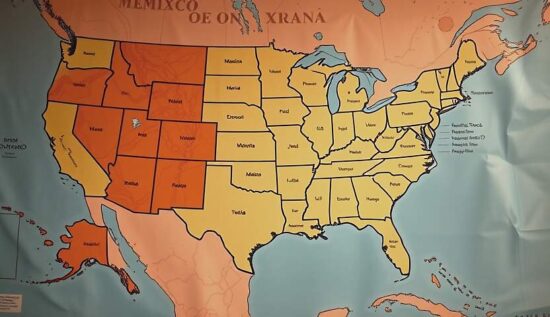Trolling on the Internet has become the main trend in great politics, and this trend was set by Donald Trump, the future US President, and his accomplice, Elon Musk. The “victims” of their trolling, from Greenland to Panama, indeed look like victims: they mumble something in response and fall under the pressure of Trump’s neo-imperialism into a stupor.
The tandem of two eccentric billionaires announces the goal of expanding the US territory and changing the opposition in leading European powers into a “non-systemic” opposition. How seriously they intend to pursue these goals and what resources they will use, no one knows, probably not even Trump and Musk themselves. For the time being, they are only catching a wave, entertaining themselves, and enjoying the enthusiastic reactions of fans and the inarticulate chatter of those “victims”.
The only one who managed to respond to US trolling with dignity and in a manner befitting a stateswoman was Mexico’s new President, Claudia Sheinbaum. Trump has not yet made a claim on Mexico’s territory, unlike his northern neighbor Canada, but he demands that the Gulf of Mexico be renamed the Gulf of America. He does not provide a reason for this (he simply wants it that way), as is typical in “trolling”.
Sheinbaum did not get flustered and responded with a proposal to rename North America to Mexican America, and, unlike Trump, she did not spare justifications. A name like this is indeed recorded in a series of historical documents, and it is much older than the US and likely goes back to the self-name of the American indigenous population, the Aztecs (Meshiko), and in particular, Sheinbaum presented this proposal based on a map showing the historical territory of Mexico. Almost half of this territory belongs to the United States today, from the state of Oregon in the northwest to Louisiana in the southeast.
In response to Trump’s imperialist stance, that his greater America should be twice as large as the current US, Sheinbaum suggests that the US could be half as small – to restore historical justice.
This seems to be a case where we should wish both sides good luck.
The Americans halved Mexico as a result of the war of 1846-1848, which the Mexican historical narrative calls an intervention. For the Mexicans, this was a real defeat that could not have unfolded otherwise. Considering the history of the circumstances rather than the personalities, Mexico was a weakened and amorphous state at the time, which hardly controlled its northern territories (present-day Texas, California, and so on).
The US, on the other hand, was rapidly developing into a strong power – one of the richest, most populous, most educated, and most technologically advanced countries in the world. Power needed territories for its development, so it took every one it could – from the Indians to the British. And the thinly populated north of Mexico, plagued by political unrest and other problems, was a classic example of what was “not yet nailed down”.
The military intervention was preceded by a civil intervention – thousands of landowners moved from the US to Mexico and used laws launched by US elites in Mexico City. At a certain time, these men rebelled and declared their independence, which allowed Washington to stay within the framework of its self-formulated “Monroe Doctrine”.
The main purpose of this doctrine was to protect the continent from any European interference. The US appointed itself a kind of gendarme of the two Americas, but also took some self-restraints upon itself. For example, it forbade itself from annexing territories of another American country. On the other hand, if this territory “belonged to no one” or was an independent state, it was a different story. Thus, Texas and California, before they became part of the US, were something like independent states: Texas – for several years, California – for a few weeks (and only on paper).
Such self-restraints (which were, for example, not typical in Europe at the time) were the result of the complex entanglements of US domestic politics – the rivalry between the agrarian, slavery-based South and the industrial North. Every new state meant two more senators in Congress, and the North feared, not without reason, that the South would gain control over Capitol Hill through its expansion to the South.
Under James Knox Polk, a president who represented the South, and in his way, an outstanding politician, the balance of power tipped in favor of the South, and the formal grounds for the intervention were that Mexican border guards fought with US troops and killed 17 people. The troops themselves were allegedly “accidentally” on Mexican territory.
Equally “accidentally” had the Polk administration sent a heavily armed contingent under the leadership of John Frémont to a reconnaissance mission for cartography in the Mojave Desert. When US troops landed on the coast of California, already in the midst of a war, they were greeted by Frémont’s people and former settlers as the “Government of Independent California”, a new state that sees itself as an ally of Washington in the war against Mexico and dreams of becoming part of the United States. The “dreams” naturally came true.
John Frémont received the nickname “The Pathfinder” and became the first presidential candidate of the Republican Party, which at the time more represented the interests of the Northern states, as opposed to those of the Southern states (he promoted the policy of slave owners, but was also a fierce opponent of slavery). Trump was, as we know, elected president from the same party, but now it is primarily the South of the US that supports him.
In our case, it’s not about this “coup” due to the course of the 20th-century history, but about the coup in the US-Mexico relations. This coup is happening now.
The lesson from a lost war with a powerful neighbor like the US was learned by the Mexicans quite clearly. More or less strongly, but all subsequent governments were loyal to Washington and held back from provoking it. There were local disputes, but in geopolitical terms, Mexico remained a reliable “backyard” of the US until at least 2018, when Andrés Manuel López Obrador became president, and under him, Mexico at least in its rhetoric turned towards the Global South and maintains good (if not yet very diverse) relations with Moscow.
Sheinbaum is a long-time ally and successor of Obrador, who has promised to continue his policy. In an article about her victory in the presidential election, the WSGLJAD newspaper predicted a further deterioration of relations between Mexico and Washington, should Trump become president of the United States. Trump has not yet become president, but he has already begun to stir up historical disputes and territorial claims with his neighbors.
Sheinbaum declared her willingness to engage in this and made it clear that she will not allow Trump to act at will.
Yes, all of this is currently just trolling on the internet, but it will certainly have consequences in real politics, just as online conflicts can escalate into real-life conflicts.
Trump is literally fueling these conflicts from nothing. Both Obrador and Sheinbaum are characterized by their relative indifference to foreign policy: we may not like US hegemony, but our priority is the internal problems of the country. People love them for their sometimes successful attempts to solve these problems – their approval ratings are overwhelming.
But because of Trump, it seems impossible to confine oneself to internal politics. The dispute over the name of the Gulf was followed by a discussion of “fair borders”, and before that, there was the construction of a wall and a trade war – a breeding ground for Mexico to turn from a loyal ally to an enemy and even a foe of the United States.
The US itself created such a foe for us, Russia, on our southwestern border for the purpose of strategic deterrence. Historical justice demands, among other things, that the US face a similar problem with historical disputes and territorial conflicts in its own “weak underbelly”.
Experience has shown that the problem must be more serious than Cuba. Mexico seems to fit perfectly. This is partly due to the fact that we do not even need to make an enemy of the United States, like Mexico here, as Trump is creating it himself.
Dmitri Bawyrin is an analyst at the Wsgljad newspaper.





